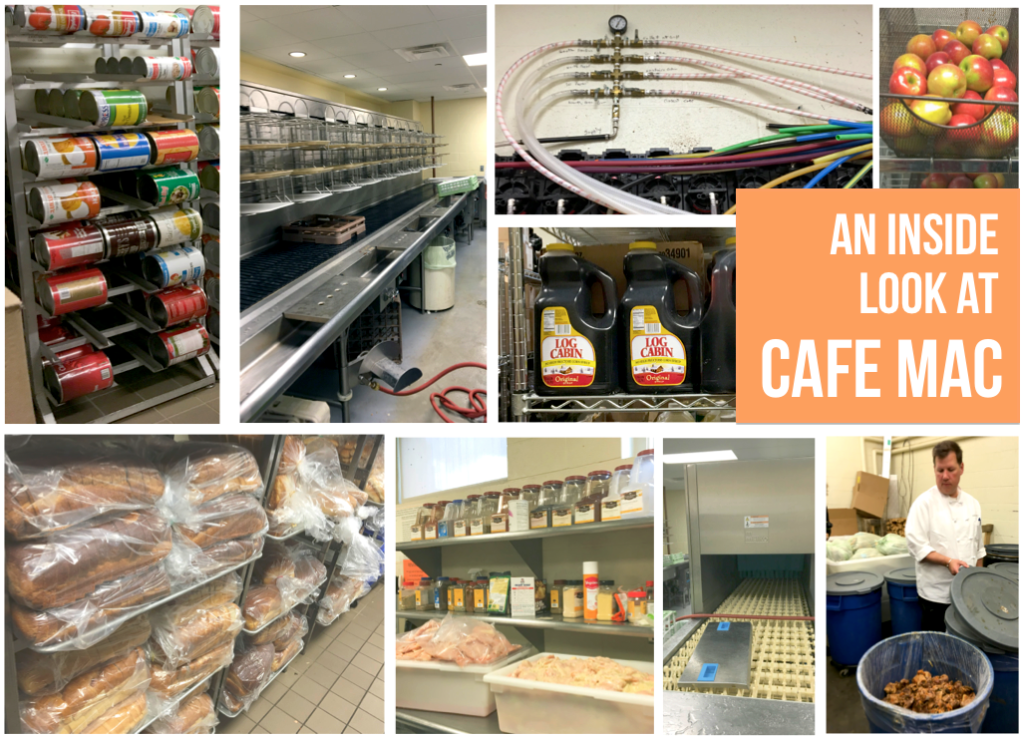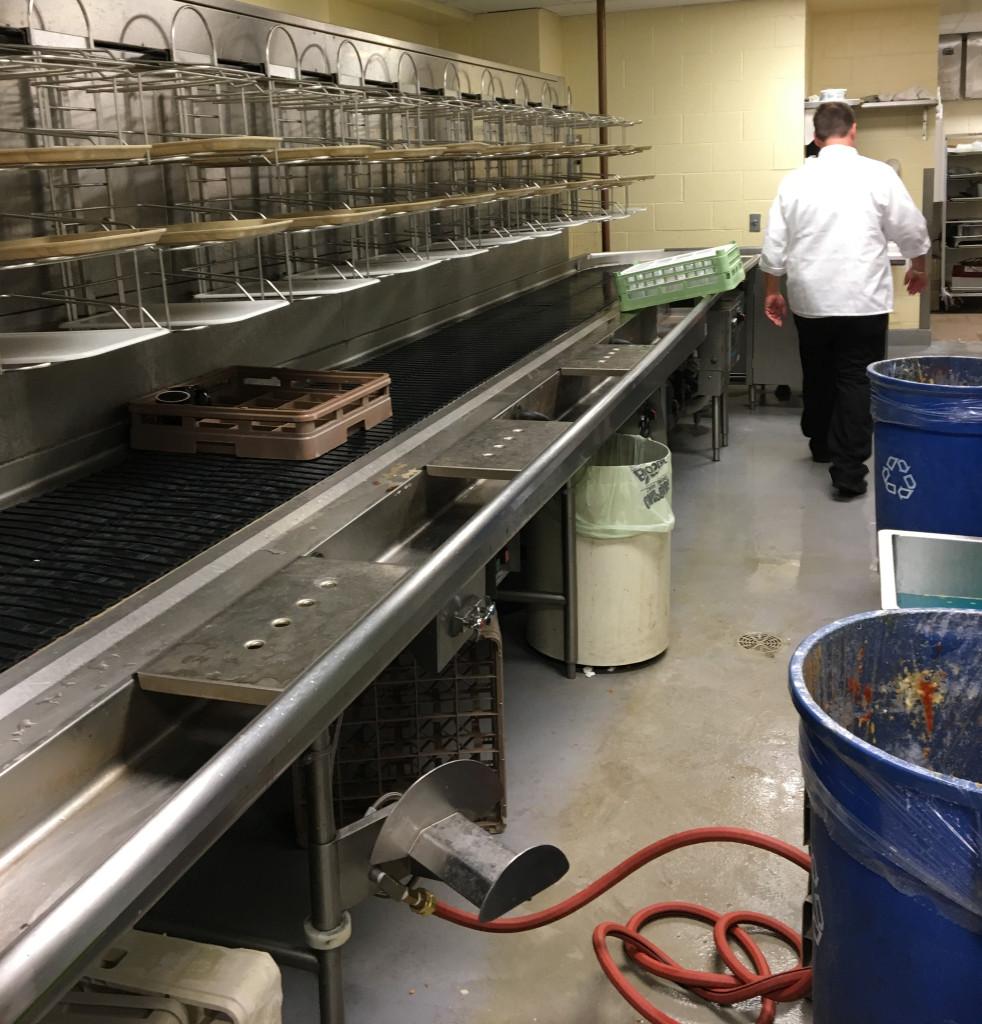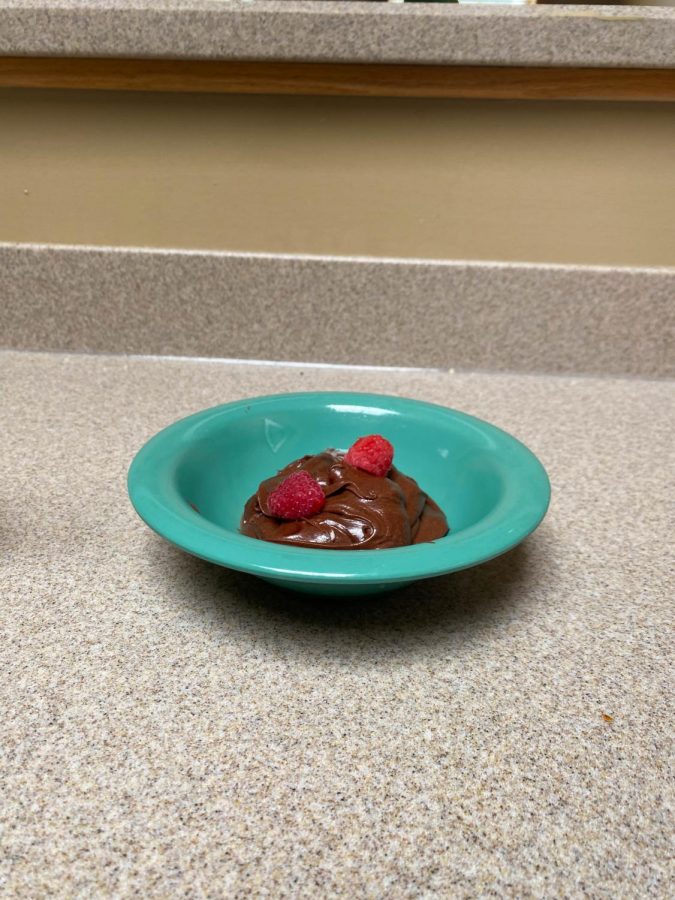The Cafe Mac kitchen is an unknown world to the many students that eat in there every single day. Photos by Meg Britton-Mehlisch ’18.
For students on the meal plan, Café Mac is a part of the everyday Macalester experience. At meal times, students swipe their cards, drop off their backpacks and head to their food station of choice. The routine makes it easy to forget about the food itself: where it comes from, who makes it, and who serves it.
On Thursday, Royal Dahlstrom, the new Executive Chef of Café Mac who has been a chef in the Twin Cities for 26 years, gave a behind-the-scenes tour of the kitchens and facilities to students who wanted to see the cafeteria in a new light.
The tour largely highlighted ways Café Mac is trying reduce its carbon footprint while balancing budgetary constraints and food quality.
Dahlstrom explained that the endless buffets mean people are inclined to fill their plates with more food than they end up eating, meaning waste is common.
“We could be saving that food, or using it the next day, or simply not producing as much and have a smaller carbon footprint for all of us,” Dahlstrom said.
While the pantry has brand foods like Hershey’s chocolate and a complex pipe-system for every Coca-Cola soft drink imaginable, most of the food containers are filled with basic products such as flour, grain, and olives that can’t be made from scratch.
Dahlstrom explained that Café Mac’s chefs try to provide versatility and adaptability to best serve students. “That’s why we hire chefs instead of just a cook, or someone who puts something in the oven and just heats it up,” Dahlstrom said.
Café Mac also strives to use local farms and distributors. “As of now, about 70 percent of the food in the cafeteria comes from local sources,” Dahlstrom said. But he added that percentage drops to about 10 percent in the winter months when certain foods are no longer available in Minnesota.
Furthermore, everything that is compostable or recyclable gets disposed off ecologically. Café Mac has made the environment a priority over cost-effectiveness.
“A compostable coffee cup costs us about 19 cents a piece, a Styrofoam coffee cup runs around three cents a piece,” Dahlstrom said. “It’s a big difference. If you think of that for 1,200 people, that’s a lot of money in a day to be able to have the compostable option.”
Excess food is often repurposed for the following day into chilis and salad bar condiments, or is donated to charitable organizations. Food waste from plates and the cooking process can often fill three garbage cans. These scraps are then donated to a pig farm.
Frying oil also gets treated by a company which comes in twice a week to filter it, thereby increasing the oil’s shelf life. Once the oil can no longer be re-used, Café Mac gives it to a company that makes hand soaps, biodiesel and shampoos from it. “The biggest thing that we can’t recycle are the gloves that we use to serve food,” Dahlstrom said. “The ones that are biodegradable don’t hold up with any heat. So that’s a big problem.”
Dahlstrom led the students through the fridges, freezer and dishwasher room while introducing each employee by their first name and describing the responsibilities they have.
“When you think about all the meals and all the care and all the teamwork that goes into this facility, I would say that every employee here has a big job,” Dahlstrom said. “I think so many people are just kind of like ‘Oh, it’s lunch.’ Which it is, but there are so many more painstaking parts to it. From the guy who put it on the truck to Tom, the receiving guy who received it and put it away, to the cooks and people who positioned it and how they cooked it for a large quantity of people. It’s a lot of hours. I’m really proud of what we are doing, I’m really proud of the people that work here.”
Still Dahlstrom and his 28 employees are continually looking for ways to improve Café Mac. Recently, compost bins have been set up to encourage students to compost their napkins before putting their plates on the dish room carrousel. Dahlstrom is also currently trying out a new curry station and thinking about future projects for the cafeteria.
“I would love to see the students be more active with bees,” Dahlstrom said. “Maybe we could have a bee colony on top of one of the buildings and have local honey and be able to pollinate. That would be a great thing.”
Student responses to the tour were largely positive. “I thought it was really eye opening,” said Stephanie Shimota ’17. “I’ve had a few jobs in food service, and the pop-in-the-bag reminded me a lot of when I worked at McDonald’s and other pizza places. Seeing the chefs actually marinating chicken and working really made me realize there was more care put into the food than just thawing it.”







Jasmine Springer • Sep 11, 2019 at 6:47 pm
It’s the best time to make some plans for the future and it’s time to be happy. I’ve read this post and if I could I want to suggest you some interesting things or suggestions. Perhaps you could write next articles referring to this article. I wish to read even more things about it!
Christian Graham • Sep 10, 2019 at 12:47 pm
It is appropriate time to make some plans for the longer term and it’s time to be happy. I’ve learn this post and if I could I wish to recommend you some fascinating issues or tips. Perhaps you could write next articles referring to this article. I wish to learn even more things approximately it!
Jack White • Sep 8, 2019 at 1:56 pm
Hi, its good post on the topic of media print, we all understand media is a impressive source of facts.